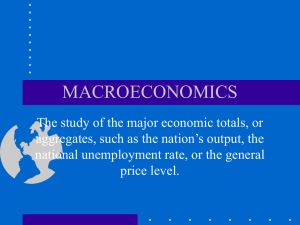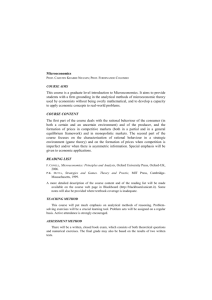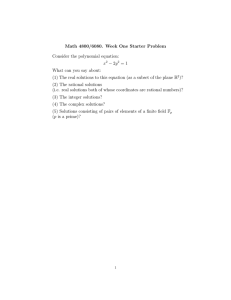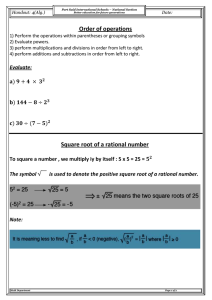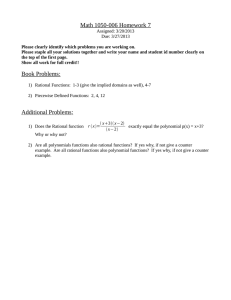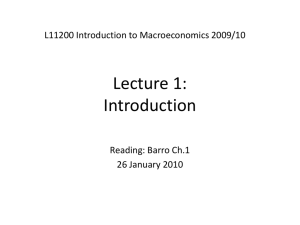advertisement
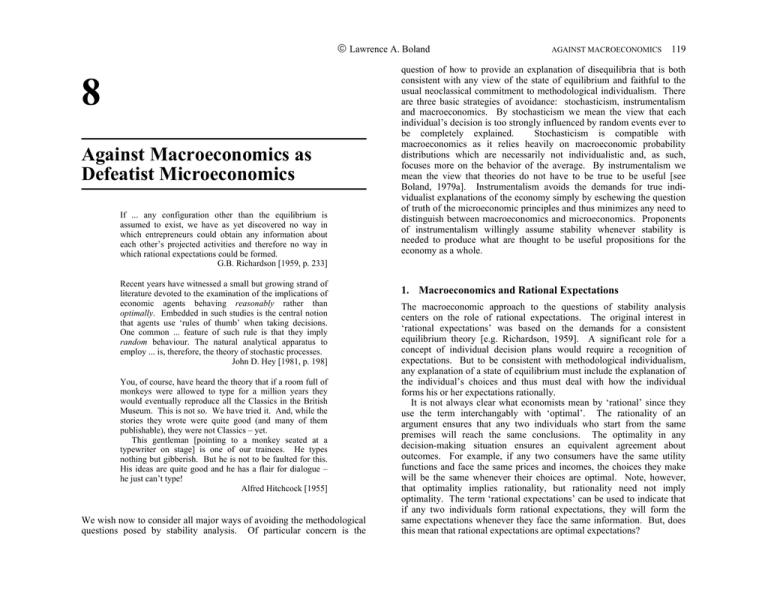
Lawrence A. Boland 8 Against Macroeconomics as Defeatist Microeconomics If ... any configuration other than the equilibrium is assumed to exist, we have as yet discovered no way in which entrepreneurs could obtain any information about each other’s projected activities and therefore no way in which rational expectations could be formed. G.B. Richardson [1959, p. 233] Recent years have witnessed a small but growing strand of literature devoted to the examination of the implications of economic agents behaving reasonably rather than optimally. Embedded in such studies is the central notion that agents use ‘rules of thumb’ when taking decisions. One common ... feature of such rule is that they imply random behaviour. The natural analytical apparatus to employ ... is, therefore, the theory of stochastic processes. John D. Hey [1981, p. 198] You, of course, have heard the theory that if a room full of monkeys were allowed to type for a million years they would eventually reproduce all the Classics in the British Museum. This is not so. We have tried it. And, while the stories they wrote were quite good (and many of them publishable), they were not Classics – yet. This gentleman [pointing to a monkey seated at a typewriter on stage] is one of our trainees. He types nothing but gibberish. But he is not to be faulted for this. His ideas are quite good and he has a flair for dialogue – he just can’t type! Alfred Hitchcock [1955] We wish now to consider all major ways of avoiding the methodological questions posed by stability analysis. Of particular concern is the AGAINST MACROECONOMICS 119 question of how to provide an explanation of disequilibria that is both consistent with any view of the state of equilibrium and faithful to the usual neoclassical commitment to methodological individualism. There are three basic strategies of avoidance: stochasticism, instrumentalism and macroeconomics. By stochasticism we mean the view that each individual’s decision is too strongly influenced by random events ever to be completely explained. Stochasticism is compatible with macroeconomics as it relies heavily on macroeconomic probability distributions which are necessarily not individualistic and, as such, focuses more on the behavior of the average. By instrumentalism we mean the view that theories do not have to be true to be useful [see Boland, 1979a]. Instrumentalism avoids the demands for true individualist explanations of the economy simply by eschewing the question of truth of the microeconomic principles and thus minimizes any need to distinguish between macroeconomics and microeconomics. Proponents of instrumentalism willingly assume stability whenever stability is needed to produce what are thought to be useful propositions for the economy as a whole. 1. Macroeconomics and Rational Expectations The macroeconomic approach to the questions of stability analysis centers on the role of rational expectations. The original interest in ‘rational expectations’ was based on the demands for a consistent equilibrium theory [e.g. Richardson, 1959]. A significant role for a concept of individual decision plans would require a recognition of expectations. But to be consistent with methodological individualism, any explanation of a state of equilibrium must include the explanation of the individual’s choices and thus must deal with how the individual forms his or her expectations rationally. It is not always clear what economists mean by ‘rational’ since they use the term interchangably with ‘optimal’. The rationality of an argument ensures that any two individuals who start from the same premises will reach the same conclusions. The optimality in any decision-making situation ensures an equivalent agreement about outcomes. For example, if any two consumers have the same utility functions and face the same prices and incomes, the choices they make will be the same whenever their choices are optimal. Note, however, that optimality implies rationality, but rationality need not imply optimality. The term ‘rational expectations’ can be used to indicate that if any two individuals form rational expectations, they will form the same expectations whenever they face the same information. But, does this mean that rational expectations are optimal expectations? 120 METHODOLOGY FOR A NEW MICROECONOMICS Lawrence A. Boland Any discussion of rational expectations must raise the question about how individual decision-makers learn or form expectations. This may be two separate questions. One question concerns theories about how people learn from objective information and thus about the extent to which facts (or ‘data’ [Hayek, 1937/48]) matters. The other deals with the adequacy of the information set for the formation of any expectations. If everyone uses the same ‘set of information’ and everyone uses the same means of processing that information, the theorist might be able to predict and possibly explain what everyone is doing. The universal explanation is that individuals form their expectations by processing the same information set. While the methodological requirement of explaining how individual decision-makers form their expectations is frequently recognized, not much has been accomplished at the level of microeconomics [see Gordon and Hynes, 1970]. The theorist could assume that there is one sure method of learning from the objective facts, and that every individual is guided by this method. This may avoid any complexities of dealing with each individual’s learning experience. Alternatively, the theorist could just examine the nature of the universal information set, since it is assumed to be the ultimate basis of every individual’s expectations. How people actually learn from the information set will not matter so long as their learning method is ‘rational’. Specifically, if the information set changes, the only remaining question concerns how each individual responds? Explaining an individual’s expectations is thus reduced to an exercise in comparative statics. If the economic model is one where the preferences and production functions are presumed to be known, the explanation is only a matter of understanding the exogenous changes in the information set. This is because when any exogenous given changes, it must appear to change. The appearance of change constitutes a change in the information set. Thus, if it is assumed that individuals form rational expectations, every specific change in the information set implies a specific change in expectations. To make this claim the model-builder would have to rely on several methodological assumptions. Let us list them. First, and foremost, is the assumption that there is one and only one universal method of learning. Second, and almost as important, is the assumption that the method employed is a sure method: if we compare the expectations formed from two information sets, and if the two information sets are identical, then the expectations based on them must also be identical. The third assumption is that all the preferences and production functions are known to the model-builder; this one is only a matter of the convenience of the model-builder. Usually, no major theoretical question of interest involves this assumption, since, even if the model-builder knew all the preferences, questions would still be begged about the decision-maker’s AGAINST MACROECONOMICS 121 learning method and its reliability. A fourth assumption is that there is an automatic connection between changes in the exogenous variables and changes in the information set. None of these are trivial assumptions. Unfortunately, when economic theorists think there may be a problem with expectation formation, it is usually attributed entirely to inadequacies of the information set rather than to the reliability of the individual’s method of learning. That is, whenever it is possible to form two different sets of expectations given any one information set, it is presumed that such a possibility is evidence of the insufficiency of the information set rather than of any inadequacy of the learning method. This interpretation of such a possibility is really a symptom of the particular theory of learning that is always employed. It is the theory of inductive learning that we have mentioned many times. In simple terms, it is the theory that says ‘facts speak for themselves’. Given this theory, any uncertainty in the message of the facts is not to be attributed to an inability to process the information. The learning method is presumed to be infallible and unambiguous whenever the information is adequate. Thus, it does not matter who perceives the information set, the conclusions reached are the same. The inevitability of theorist and the individual decision-maker reaching the same conclusion regarding the individual’s optimum is the basis of the modern use of the Rational Expectations Hypothesis. Given all these methodological assumptions it is easy to see why modern macroeconomic theorists can so easily assume that the individual decision-makers base their plans on rationally formed expectations. Even though perfect knowledge is not presumed, there is still a presumption of a perfect method of learning albeit a slow method. Whenever all individuals are presumed to be processing the same information set, it does not matter whether the theorist is explaining the ultimate general equilibrium or is explaining an aggregate variable which no single individual could ever determine. By concentrating on aggregate variables, one does not have to worry about explaining any individual’s expectations or learning method, since any individual’s decision based on an inadequate learning method is presumed to have little effect on the values of the aggregate variables for the reasons we discussed in Chapter 3. The only obstacle in the way of avoiding the microeconomic problems about how the individual makes a choice based on expectations of a future equilibrium is the troublesome question of how we can be sure that no individual’s errors will cause a disequilibrium or prevent an equilibrium. As it was originally stated by John Muth, who introduced the explicit presumption of rational expectations: ‘Expectations, since they are informed predictions of future events, are essentially the same as the predictions of the relevant economic theory...’ [1961, p. 316]. There are 122 METHODOLOGY FOR A NEW MICROECONOMICS Lawrence A. Boland two reasons why the individual’s expectations would be ‘essentially the same’. One is that the ‘sameness’ is based on the assumption that we have been discussing. It is the innocent appearing assumption that ‘facts speak for themselves’ – which means, without any help from a priori knowledge. The other is that the ‘sameness’ is based on a belief that the ‘relevant economic theory’ has a solid and sufficient foundation of empirical facts which can be observed by anyone. These reasons contradict a popular criticism which claims that Muth’s so-called Rational Expectations Hypothesis lacks a theory of how expectations are formed [B. Friedman, 1979]. The belief in a solid foundation is a belief that the relevant economic theory has already been inductively established, using only observable facts with a learning method that is based on a presumably reliable inductive logic. As such, an individual using the same facts inductively to form his or her expectations cannot deviate much from the expectations based on the ‘relevant economic theory’. The only way an individual’s expectations can deviate is when not all the available information is used – perhaps, only because processing all the available information may be too costly for one individual. In this sense, an individual’s expectations will not usually be perfect because of the inadequacies of the chosen information set. Thus we see Muth adding that, ‘The [rational expectations] hypothesis ... [is] that expectations of firms ... tend to be distributed, for the same information set, about the prediction of the theory...’ [Muth, 1961, p. 316]. If we retreat from believing there is a reliable inductive learning method, we have even more reason for deviations between those expectations formed by an optimizing individual and those expectations that a theorist would predict that the individual would form, given the relevant economic theory. But, when we give up the belief in reliable inductive learning, there is no reason to suspect that the relevant economic theory would give expectations that are any more accurate than ones which individuals form. Whenever inductive learning is imperfect, there is no reason for expectations to be distributed ‘about the predictions of the theory’ rather than about some other set of predictions. We must then conclude that Muth and the advocates of the Rational Expectations Hypothesis definitely believe in the reliability of inductive learning. This is unfortunate since there is no reliable inductive learning method. The problem with the Rational Expectations Hypothesis is not that it lacks a theory of learning, but that it relies on a false theory of learning. For the Rational Expectations Hypothesis to provide a means of avoiding the difficult microeconomics questions about learning or expectations formation, facts must not only speak for themselves but they must say the same thing to every individual. But without a AGAINST MACROECONOMICS 123 perfectly reliable learning method, we usually find that the method with which one interprets the facts is heavily influenced by one’s a priori theories [Boland, 1977a, 1980]. In other words, expectation formation depends on theories. Facts, if they speak at all, speak only with the help of one’s theories – all facts are ‘theory laden’ [Hanson, 1958/65, p. 19]. This raises many problems unless there is some reason given for why all individuals believe in the same a priori theories [see also Frydman and Phelps, 1983]. Without a reliable inductive logic there is no reason to suspect that any two individuals would believe the same theory nor any reason for why they would react to the same information set in exactly the same way. We see now why some disequilibrium theorists see that this implies random behavior, and thus why they see a necessity of basing macroeconomics or general equilibrium theory on an understanding of stochastic processes [e.g. Hey, 1981]. 2. Stochasticism and Macroeconomics If one thinks that the only possible theory of knowledge and learning is one that says people must form expectations inductively while one also admits, either that inductive learning is unreliable, or, that reliable inductive learning will always require more information than is possible in logical or practical terms, then it seems that one would have to conclude that a complete theory of microeconomics is impossible. Although some economic theorists recognize that there are other theories of learning, most economics students are taught to focus their attention on the problem of forming expectations with inadequate information. If one thinks information is necessarily inadequate, one can never be sure what expectations each individual will form. Thus, any macroeconomic theory will only be concerned with the behavior of the average individual on the hope that any uncertainty concerning one individual will be cancelled out by the simultaneous consideration of all other individuals. Furthermore, given that no individual’s expectations can be predicted exactly, the choices made by the average individual may be considered random variables much like those discussed in the typical elementary statistics textbook. In effect, by diverting attention to the average individual the role of each individual is minimized. The only way to explain the behavior of the average is to explain the behavior of the whole economy – that is, to provide a macroeconomic theory based on the exogenous variables and information set available to the whole economy. Stochastic macroeconomics has been very popular over the last fifteen 124 METHODOLOGY FOR A NEW MICROECONOMICS Lawrence A. Boland years. Particularly so since most graduate students find building stochastic macroeconomic models to be a much more convenient activity than trying to speculate about theories of how individuals make decisions based on supposedly inadequate information. The popularity is easy to explain. The students make a rational choice to spend their time collecting mountains of data, which is fed into computers to reduce the data to commonly understood parametric statistics. The explanation is that the students form expectations about benefits and the probability of success of such model building and compare them to the benefits and probabilities that are expected of theoretical speculations. Even if the model itself is not a major contribution, at least the process creates new data (presumably for a future inductive learner). Obviously, the retreat to stochastic macroeconomic model building is a defeatist position with respect to the many major questions posed by the microeconomic theorists concerned with how we are to explain the process by which individuals make decisions in a disequilibrium setting. There is one group of economic theorists who think they have a way to avoid such defeatism. They would say that the individual learns by forming opinions about the likelihood of certain future states of the world and then the individual sets about updating those opinions in the light of new evidence. They call this the Bayesian learning theory [e.g. Hey, 1981, Ch. 6]. This is just a sophisticated version of the old inductive learning theory that was causing the problem in the first place. However, this version is thought to be an improvement because it relaxes the view that ‘facts speak for themselves’ by admitting that the learning process begins with something more than just facts. This modified inductive learning process begins with the individual’s opinion, and then the individual is supposed to learn from newly collected facts by systematically revising the original opinion. The source of the original opinion does not matter – it may even be a priori – but it is a necessary starting point. The key element of the Bayesian learning process is the nature of the original opinion. In the simple form of Bayesian learning, an opinion is an estimate of the probability of occurrence of a future event or of a future value of a specific variable. Since the initial opinion does not have to be based on facts, the opinion is said to be a ‘subjective probability’. Since the opinions are represented as probability estimates and learning is defined as the process of updating one’s estimates, the analysis of learning is usually performed using an appropriate mathematical tool called Bayes’ theorem. The detailed nature of Bayes’ theorem will be of no interest here since the theorem is only invoked to overcome the inadequacies of the strict inductive learning process – to overcome the view that only facts matter. AGAINST MACROECONOMICS 125 The problem with strict inductive learning is that unless one has inductively proven that one’s knowledge or expectations are true, one has not learned anything. One only has an incomplete proof, a short-run collection of observed facts. It would take a very long run to be able to claim to have learned anything. Practical decision-making cannot wait – expectations must be formed in order to make one’s plans. If knowledge is thought to be based on more than just the facts, then perhaps one has learned something even though the knowledge has still not been inductively proven true. In effect, the idea of a Bayesian learning process provides a short-run barometer of the progress being made toward an eventual inductive proof. In the simple form, the short-run barometer is represented by the probability estimate itself and the closer it gets to unity the closer one is to a proof that one’s estimate is true. While the probability of a single event really does not usually make sense, economic theorists find the idea of a probability of a random variable more compatible with their training in calculus techniques. Random events either occur or they do not. When they do, the probability of occurrence is one, and it is zero when they do not. Random variables are thought to have a probability distribution which means that the probability of one (i.e. 100 percent) is considered to be divisible into quantities that can be distributed over a range of possible values of the variable such that any particular value of the variable will usually have a probability of occurrence that is between zero and one. Of course, this makes no more sense than the probability of a single event being between zero and one. The variable in question can only have one value at a time, so the probability of any specific value at any specific time is still either zero or one. Nevertheless, it is claimed that a very useful method of model building can be developed if we accept the fictitious idea of a subjective probability. A more complex view of Bayesian learning has the individual form a subjective estimate of the true objective probability distribution for any variable in question. Learning, in this complex view, occurs as the subjective distribution converges to the objective distribution. This view, unfortunately, simply accepts an incomplete explanation of any variable. It also opens the concept of Bayesian learning to an infinite regress since the individual can have an opinion of the probability distribution of the probability distribution of the probability distribution ... ad infinitum. The basic idea of Bayesian learning is that almost any new information will affect the opinion of the decision-maker [Chetty, 1968, Leamer, 1983]. In the simple form, Bayesian learners are only concerned with forming an opinion with the highest subjective probability after sufficient information has been processed. In the 126 METHODOLOGY FOR A NEW MICROECONOMICS Lawrence A. Boland complex form, Bayesian learners are concerned about the variance of their individual opinions as new information is continually collected. If new information causes a wider variance in the estimates, the individuals may reject the possibility of a particular value of a variable simply because their opinions are not reliable. One might question what has been learned with either form of Bayesian learning. In both cases learning is really only a reflection of a priori methodological opinions about what the form of the true opinion must be. Those that think the true opinion is a probability distribution with little variance will think they are learning in the short run whenever the variance is diminished with each new fact. Similarly, those that think the true value will always have the highest probability estimate, even for the short-run collection of information, may be missing the point. As is often pointed out, the boldest conjectures may be true but their boldness is usually against the overwhelming evidence that is pointing in some other direction. Maximum Possible Benefits AGAINST MACROECONOMICS 127 of the economics of learning is consistent with the Rational Expectations Hypothesis in the sense that perfect knowledge (probability 1.00) is not rational whenever one has to pay for the information to achieve such knowledge. The optimally imperfect knowledge will thus necessarily have a subjective probability less than 1.00. As accommodating as this may seem for someone interested in building models which allow for a choice-theoretic view of knowledge, information or expectations, it depends too much on our familiar, questionable theory of knowledge and learning – namely, that all knowledge is acquired inductively – even though there is no claim that for knowledge to exist, it must be inductively proven to be perfect. Whenever the model-builder is willing to overlook this questionable dependence, there is no reason to reject the idea of subjective probability on the grounds of subjectivity alone, since subjective probability is no more subjective than utility. In many ways, the assumption of Bayesian learning begs more questions than it answers. And worse, it is intellectually no more satisfying than the simple minded theory that one’s knowledge must be based on inductive learning such that new facts alone always constitute learning even though there is no guarantee that one has ‘learned’ the true expectations or true knowledge. Benefits Optimum Benefits sts 3. Stochasticism as Instrumentalism Co $0.00 Optimum Quantity Quantity of Information Figure 8.1. Forming rational expectations The idea of Bayesian learning is easily accommodated in equilibrium models by claiming that learning is just a weak form of inductive learning based on the economics of learning. The basic idea in the economics of learning is that more information yields a higher subjective probability but at a diminishing rate – we call this the ‘inductive learning possibilities function’. If there is a given cost of each unit of information, there will be a rising straight-line cost curve that can be compared with the benefits curve represented by the inductive learning curve – see Figure 8.1. When viewed this way, there is an optimal amount of information at the point where the slope of the cost curve equals the slope of the learning curve – so long as the slope of the learning curve diminishes as information is collected. Clearly, this view Some economists will not like our use of the idea of true expectations or true knowledge as a basis for rejecting techniques of modelling learning such as the Bayesian approach. They may say that such a basis for criticism is misleading since nobody could ever have true expectations or true knowledge if they are learning inductively or in a Bayesian manner. They may say, in effect, that true knowledge or the formation of true expectations would require a virtual infinity of information which would at best cost far too much [e.g. Stigler, 1961]. They may say that what economic theorists must explain is why an individual chooses to have economically optimal, but imperfect, knowledge and thus form imperfect expectations. Some critics even go so far as to argue that for practical purposes true knowledge is not even needed. For the last group of economists [e.g. Friedman, 1953] our theory has no other purpose than to serve as a instrument for forming economic policy or for forming predictions of the consequence of policies. Practical success is all that matters [cf. Boland, 1979a, 1980, 1981a]. Avoiding complex theoretical problems, such as those posed by all the considerations of disequilibrium economics or of stable equilibrium processes, is all too easy. Obviously, the time required to form perfect expectations is impossibly long, but the time required to benefit from a 128 METHODOLOGY FOR A NEW MICROECONOMICS Lawrence A. Boland Bayesian learning process may also exceed that available to make dayto-day practical decisions. It might even be argued that the benefits of incorporating all the sophisticated disequilibrium concepts (such as the rational expectations hypothesis) into the ordinary neoclassical equilibrium theory may be small when it comes to questions of improving the policy-maker’s estimates and recommendations. If one thinks that economic theory is only an instrument for forming policies or making predictions, then obviously it is just as easy to say that expectations and knowledge do not have to be true for the individual decision-maker. Followers of instrumentalism reject the complex theoretical questions that are posed by the need for the disequilibrium foundations of any equilibrium model used in policy economics. For many theorists today such a bold rejection is considered a matter of bad taste. In this light most economic theorists claim they do not believe in instrumentalism – but somehow actions speak louder than words. There have been numerous articles published recently claiming that instrumentalism is not the methodological view that economists advocate [e.g. Caldwell, 1980; Fels, 1981; Wible, 1982; Hirsch and De Marchi, 1984; Hoover, 1984, as well as those critics listed in Boland, 1979a]. Nevertheless, it is difficult to distinguish instrumentalism from the defeatism implied by stochastic macroeconomic model-building. It makes no difference whether the stochasticism advocated is in the form of elaborate econometric models of simultaneous equations where each equation includes an error term which admits that the equation does not have to be exactly true, or it is in the form of the stochastic decision processes where learning is always thought to be imperfect. The justification for stochasticism is ultimately the same as the argument given for instrumentalism. The usual reason given for advocating the development of stochastic macroeconomic models is that an accurate theory of the individual would be computationally too complex. The usual reason for opting for instrumentalism is that a true short-run theory of individual behavior (or of macroeconomic behavior) would be too complex for practical purposes. What is suppressed, both in stochastic macroeconomic models and in instrumentalist microeconomic models, is just the very methodological individualism that motivates almost all economic theories today. Stochasticism and instrumentalism, as well as macroeconomics in general, are all ways to avoid the difficult questions that have been raised by those economists interested in understanding the disequilibrium foundations of equilibrium economics or those interested in building a methodological-individualist view of the economy that does not depend on the narrow confines of long-run neoclassical equilibrium theory. AGAINST MACROECONOMICS 129 We now turn to a consideration of the three primary avenues for building disequilibrium foundations to suit equilibrium theorists and for generalizing methodological individualism to the satisfaction of nonequilibrium theorists. One avenue builds on the work of Samuelson and Arrow by pursuing the question of how prices adjust when our theory presumes that everyone is a price-taker. A second avenue tries to reconstruct the disequilibrium basis of the economics of Keynes. A third avenue attempts to go beyond the work of Hayek and Richardson by considering alternative theories of knowledge and learning, thereby avoiding the problems resulting from any dependence on the inductive theory of learning. Lawrence A. Boland Part IV Avenues for a New Microeconomics of Non-equilibria
